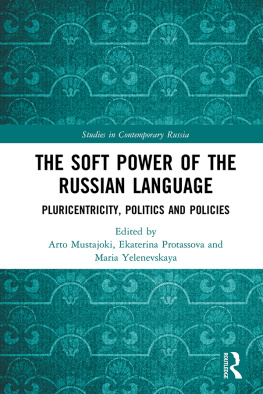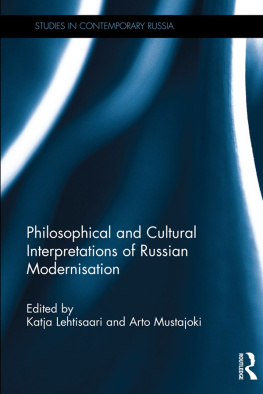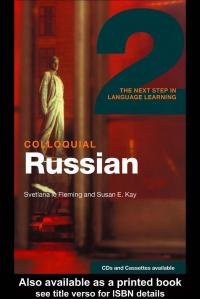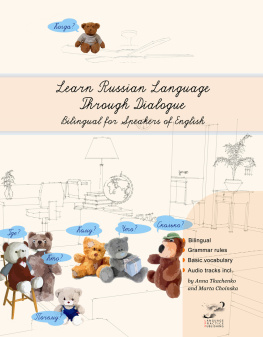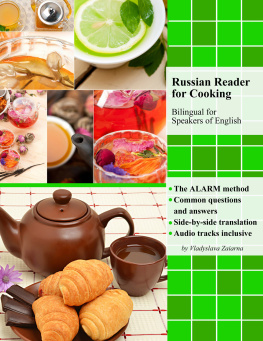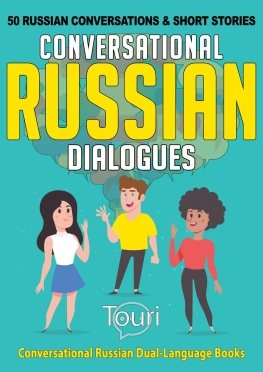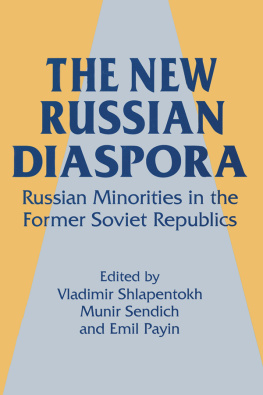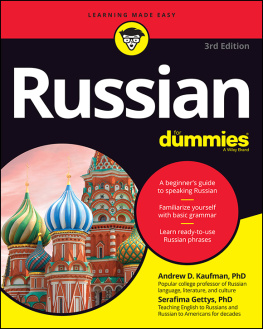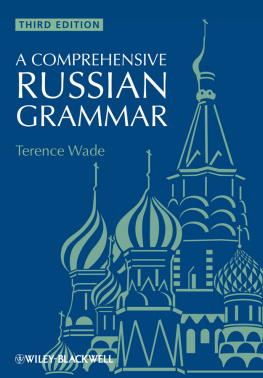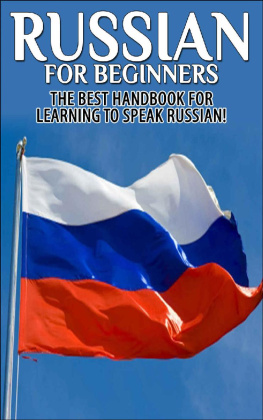The Soft Power of the Russian Language
Exploring Russian as a pluricentric language, this book provides a panoramic view of its use within and outside the nation and discusses the connections between language, politics, ideologies, and cultural contacts.
Russian is widely used across the former Soviet republics and in the diaspora, but speakers outside Russia deviate from the metropolis in their use of the language and their attitudes towards it. Using country case studies from across the former Soviet Union and beyond, the contributors analyze the unifying role of the Russian language for developing transnational connections and show its value in the knowledge economy. They demonstrate that centrifugal developments of Russian and its pluricentricity are grounded in the language and education policies of their host countries, as well as the goals and functions of cultural institutions, such as schools, media, travel agencies, and others created by migrs for their co-ethnics. This book also reveals the tensions between Russias attempts to homogenize the Russian world and the divergence of regional versions of Russian reflecting cultural hybridity of the diaspora.
Interdisciplinary in its approach, this book will prove useful to researchers of Russian and post-Soviet politics, Russian studies, Russian language and culture, linguistics, and immigration studies. Those studying multilingualism and heritage language teaching may also find it interesting.
Arto Mustajoki is Professor Emeritus at Helsinki University, Finland.
Ekaterina Protassova is Adjunct Professor in Russian language at the University of Helsinki, Finland.
Maria Yelenevskaya is Senior Teaching Fellow at the Technion-Israel Institute of Technology.
Studies in Contemporary Russia
Series Editor: Markku Kivinen
Studies in Contemporary Russia is a series of cutting-edge, contemporary studies. These monographs, joint publications, and edited volumes branch out into various disciplines, innovatively combining research methods and theories to approach the core questions of Russian modernization; how do the dynamics of resources and rules affect the Russian economy and what are the prospects and needs of diversification? What is the impact of the changing statesociety relationship? How does the emerging welfare regime work? What is the role of Russia in contemporary international relations? How should we understand the present Russian political system? What is the philosophical background of modernization as a whole and its Russian version in particular?
The variety of opinions on these issues is vast. Some see increasingly less difference between contemporary Russia and the Soviet Union while, at the other extreme, prominent experts regard Russia as a more or less normal European state. At the same time, new variants of modernization are espoused as a result of Russian membership of the global BRIC powers. Combining aspects of Western and Soviet modernization with some anti-modern or traditional tendencies the Russian case is ideal for probing deeper into the evolving nature of modernization. Which of the available courses Russia will follow remains an open question, but these trajectories provide the alternatives available for discussion in this ground-breaking and authoritative series.
The editor and the editorial board of the series represent the Finnish Centre of Excellence in Russian Studies: Choices of Russian Modernization.
The Politics of Poverty in Contemporary Russia
Ann-Mari Stre
The Soft Power of the Russian Language
Pluricentricity, Politics, and Policies
Edited by Arto Mustajoki, Ekaterina Protassova and Maria Yelenevskaya
For more information about this series, please visit: www.routledge.com/series/ASHSER-1421
First published 2020
by Routledge
2 Park Square, Milton Park, Abingdon, Oxon OX14 4RN
and by Routledge
52 Vanderbilt Avenue, New York, NY 10017
Routledge is an imprint of the Taylor & Francis Group, an informa business
2020 selection and editorial matter, Arto Mustajoki, Ekaterina Protassova and Maria Yelenevskaya; individual chapters, the contributors
The right of Arto Mustajoki, Ekaterina Protassova and Maria Yelenevskaya to be identified as the authors of the editorial material, and of the authors for their individual chapters, has been asserted in accordance with sections 77 and 78 of the Copyright, Designs and Patents Act 1988.
All rights reserved. No part of this book may be reprinted or reproduced or utilised in any form or by any electronic, mechanical, or other means, now known or hereafter invented, including photocopying and recording, or in any information storage or retrieval system, without permission in writing from the publishers.
Trademark notice: Product or corporate names may be trademarks or registered trademarks, and are used only for identification and explanation without intent to infringe.
British Library Cataloguing-in-Publication Data
A catalogue record for this book is available from the British Library
Library of Congress Cataloging-in-Publication Data
Names: Mustajoki, Arto S. (Arto Samuel), 1948- editor. | Protasova, Ekaterina, editor. | Yelenevskaya, Maria N., editor.
Title: The soft power of the Russian language : pluricentricity, politics and policies / edited by Arto Mustajoki, Ekaterina Protassova and Maria Yelenevskaya.
Description: New York, NY : Routledge, [2019] | Series: Studies in contemporary Russia | Includes bibliographical references and index.
Identifiers: LCCN 2019009430 | ISBN 9780367183660 (hardback)
Subjects: LCSH: Russian language--Former Soviet republics. | Russian language--Foreign countries.
Classification: LCC PG2750.F6 S64 2019 | DDC 306.442/9171--dc23
LC record available at https://lccn.loc.gov/2019009430
ISBN: 978-0-367-18366-0 (hbk)
ISBN: 978-0-429-06111-0 (ebk)
The editors
Dr. Arto Mustajoki is Professor Emeritus at Helsinki University, Finland. Professor Mustajoki has published nine books and 100 articles (in English, Russian, and Finnish) on Russian language, linguistic theory, Russian mind, and (with Henriikka Mustajoki) on research ethics. Recently, he has studied the biggest problem of the world: why people do not understand each other. In addition, Mustajoki has a diverse experience in academic administration and science policy. He has also compiled textbooks, dictionaries, TV courses, and computer programmes for learning Russian.
Dr. Ekaterina Protassova holds a Ph.D. in Philology and Hab. in Pedagogy. She is Adjunct Professor in Russian language at the University of Helsinki. She has authored and co-authored over 300 monographs, articles, and book chapters, headed and participated in various international and national projects investigating language pedagogies, child and adult bilingualism, and the role of language and culture in immigrant integration. Her diverse interests brought her to collaborate with researchers and serve as Ph.D. advisor in Estonia, Germany, Israel, Kazakhstan, Latvia, Russia, the USA, and others. Her service to the profession includes editorial work for various journals and publishers and organization of seminars and conference panels.
Dr. Maria Yelenevskaya is Senior Teaching Fellow and Academic Head of the Computer-Assisted Language Learning Laboratory in the Department of Humanities and Arts at the Technion-Israel Institute of Technology. Her research is devoted to the use of language in multilingual and multicultural settings, lingua-cultural aspects of immigration, computer-mediated communication, linguistic landscape of multicultural cities, and linguo-cultural aspects of humor. She has authored and co-authored over 70 research papers, three scholarly monographs, and five course books. She serves on the editorial board of three international scholarly journals and is a board member of Israel Association for the Study of Language and Society.

